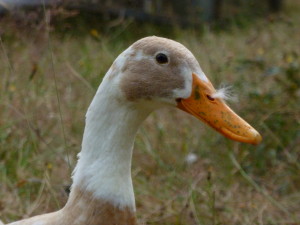There are two ways of viewing the idea of sacrifice in human culture. One is a selfless gift or a waiver of gratification. The other involves a taking of life for personal gain.
Two ducks on our farm reminded me of the gray area that exists between these perspectives. Jennifer and our daughters named them Coffee and Cream, because of their light and dark coloring. Raised separately, they were brought together after predators killed their companions.
I love ducks. They eat slugs and can be useful on a farm. Because their feet are webbed, they don’t tear up the garden beds like chickens. Their eggs are delicious, too.
People who think of ducks as purely comical creatures have never seen one grieve. There’s no other way to describe what I witnessed following the death of Cream’s companions. When a neighbor brought us Coffee, after she endured a similar trauma, I’ll never forget the solace of their new friendship. Within hours they were inseparable, waddling in tandem, probing the muck with their bills and making contented duck sounds.
Life on a farm — even a tiny one like ours — has deepened my respect for the creatures we depend on for joy and nourishment. My black-and-white view of sacrifice becomes shaded when I think of the animals I’ve killed. How do we provide for our needs in a humane way that contributes to the whole of creation?
The question may seem superfluous. After all, we live in a society where killing humans is seen as a necessity, and trained killers are lionized as heroes. The fact that innocents are slaughtered in the process hasn’t deterred us from diverting massive resources into the enterprise. Religious training gears us up for that diversion. Why concern ourselves with something as seemingly mundane as the ethical treatment of livestock?
Big journeys often begin with little steps. Killing may be necessary, and killers may be worthy of respect for their prowess. My grandmother was really good at killing chickens, for example. But she didn’t glorify it.
The path to wisdom begins with humility, and those ducks taught me a valuable lesson.
One evening I was down at the barn, going through my chores. When I went to close Coffee and Cream in their coop for the night, I noticed that their watering container was empty. So I took it to the spigot on the other side of the barn, filled it up, and carried it back to them. “There you go,” I thought, and went back to the house.
The next morning, Cream’s half-eaten body was lying outside the coop door I had forgotten to fasten. Coffee was alive, maybe because she was darker-colored and less noticeable at night. She seemed in shock for most of the day, but by the afternoon it looked like she might be recovering.
Of course I made sure to shut the coop door that evening. Coffee did not want to go in, after the terror of the night before. But I ushered her in and latched her in securely. “Did you close up the coop?” Jennifer asked when I got back to the house. “You bet,” I said, and we both slept soundly.
I cried as I buried Coffee next to Cream the following morning. I had failed to notice the hole that was gnawed in the corner of the coop. At some level Coffee knew she faced certain death in that terrible place, yet she had no choice but to obey my will as I herded her in like a lamb to the slaughter.
Shoveling dirt into her grave I thought of the words of my hero. “Forgive them,” said the rabbi, “for they know not what they do.”
Repentance and forgiveness are central in my effort to understand sacrifice. If I learn from the blood shed by my ignorance, I can accept the humbling gift of forgiveness. I must, otherwise my heart could be hardened with arrogance. I might simply strut through life taking whatever I think I need without giving much thought to the consequences.
Several days after the tragedy I was writing in my bookshop when I heard a familiar noise. At first I thought it was my imagination, because I had never heard that particular sound anywhere near the store. Then I heard it again, and a sense of urgency brought me to my feet.
I went outside and followed the sound to the park across the street. Next to the children’s playground, a dozen mallards were probing the wet sod with their bills. One had moved off to herself, and was calling out to check in with the others.
“We are not separate,” she seemed to be saying. “I’m still here with you.”
– An earlier version of this column was also printed in the Cannon Beach Citizen (May 19, 2011).

Wow, Watt, this is a powerful piece. It’s an animal-eat-animal world out there, and we can’t always prevent the natural thing from happening. I remember when we lived in Seattle, an Abyssinian cat we “owned” died from what we thought was a run-in from a car, but what I suspect to this day might have been a deliberate antifreeze poisoning from a disgruntled neighbor. The breeder we bought the cat from said to not let the cat outside, because they roam and often are hit by cars. Did we heed this? Can we be blamed for Squeaker’s death?
I know that farm life has these things happening all the time. Still, it hurts. We can give our pets and livestock the best life possible, and hope they live long enough to enjoy it. By the way, I think this way about plants too…
Thanks, Bob. Best we can do is learn from our mistakes and take better care of the life around us. Death is a hard teacher.